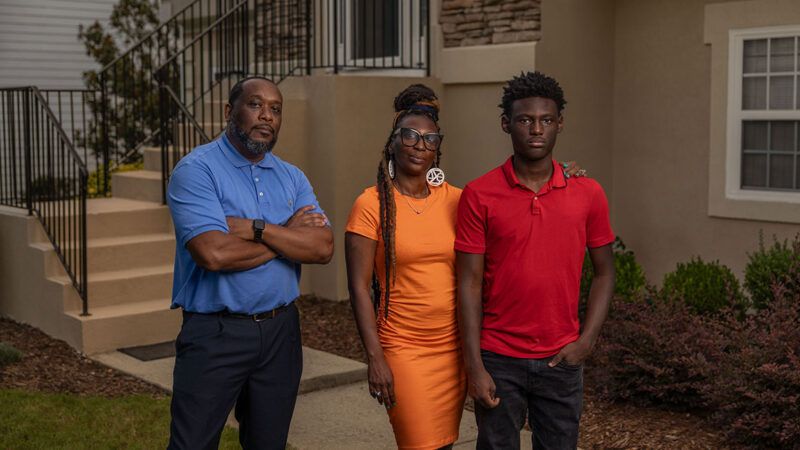The FBI Wrongly Raided a Georgia Family's Home. Now Their Case Is Going to the Supreme Court.
A federal court ruled Trina Martin could not sue the government after agents burst into her home and held an innocent man at gunpoint.

On an early morning in 2017, Trina Martin was shocked by a pyrotechnic exhibit she compares to the Fourth of July. Except it was October, and it was inside her home in Georgia.
The FBI detonated a flash-bang in the house and ripped the door from its hinges to arrest Joseph Riley, a man who lived in a different house approximately one block over. The agents would not realize their mistake until after they stormed into Martin's bedroom, handcuffing her then-fiancé, Toi Cliatt, at gunpoint.
In January, the Supreme Court announced it will evaluate whether a federal court ruled correctly when it barred Martin from suing over that nightmare scenario, in the case Martin vs. United States.
The two houses "share several conspicuous features," wrote the 11th Circuit in its ruling, such as that they are "beige in color" and have "a large tree in the front." Since it was dark outside, the judges said, it would have been "difficult to ascertain the house numbers on the mailboxes." Lawrence Guerra, who led the raid, thus received immunity.
The Court won't reconsider that conclusion. Instead, it will evaluate a part of the decision that forbade a different avenue of potential legal relief.
Martin and Cliatt also sued under the Federal Tort Claims Act (FTCA), which allows victims of abuse to bring certain state torts against the federal government. The 11th Circuit closed off that avenue as well, ruling the suit was doomed because the FBI had "discretion" in how it prepares to carry out warrants. The judges also cited the Supremacy Clause, which supposedly ensures that states do not get in the way of executing federal law. Since the agents' acts had "some nexus with furthering federal policy" and could "reasonably be characterized as complying with the full range of federal law," the 11th Circuit said any claim under the FTCA could not proceed.
Yet the FTCA was revised in the 1970s to include a proviso specifically allowing victims like Martin to sue the federal government. A bipartisan group in Congress, including Sen. Rand Paul (R–Ky.), had urged the Court to take up the case for that reason.
Congress updated the FTCA back then because of a gross abuse of police power. In April 1973, federal agents targeted the homes of Herbert and Evelyn Giglotto and Donald and Virginia Askew. Neither family was suspected of a crime. "Mr. and Mrs. Giglotto testified under oath today that they were handcuffed by screaming agents, thrown on their bed, verbally abused with a stream of obscenities and repeatedly threatened with death while an agent held a cocked gun to Mr. Giglotto's head," wrote The New York Times, reporting on testimony before the Senate in May 1973. "Much of their apartment was ransacked and damaged."
Despite the obvious parallels with what Martin experienced in the very case that inspired the FTCA update, she was deprived of recourse by the 11th Circuit—giving the Supreme Court an opportunity to send a reminder that it is the judiciary's job to interpret the law, not rewrite it.
This article originally appeared in print under the headline "Supreme Court Takes Up Wrong-House Raids."


Show Comments (32)